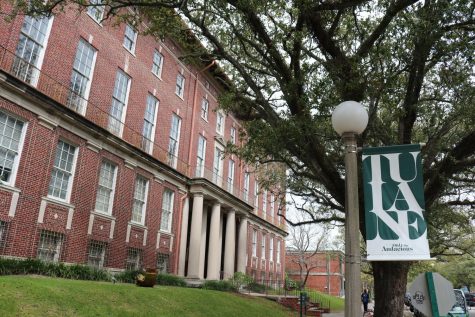Airing of Grievances: Student artists deserve the right to sell their work
March 4, 2020
To Whom It May Concern:

Art students don’t have a lot of homework. We don’t have to memorize endless terms or information for our classes. You might think being an art student is easy based on these factors. Perhaps it could be, if not for the limitations placed on us by the very institution we pay thousands to.
Let’s not mince words: Tulane is not built for low-income students, especially those pursuing a major in studio art.
With an Urban Outfitters in the bookstore and a new $55 million dining hall, it’s no secret that this university is sopping with privilege. If you’re one of the few that doesn’t come close to Tulane’s median $180,700 family income, you have probably noticed other ways this school caters to the upper class. As a studio art major, I have witnessed this first-hand during attempts to sell my art.
Restrictions on campus make selling art a challenge for many student artists. Even when the materials in question are bought and paid for on our own dime, Tulane prevents personal work made with their appliances to be sold for profit. In Woldenberg’s digital and photo labs, students are not allowed to use the printers regardless of one’s willingness to provide their own paper. These devices are sometimes password-protected, which inhibits one’s ability to print even class-related projects. Similar regulations exist in the Tulane Makerspace.
The equipment housed in these spaces — 3-D printers, photo printers, laser cutters — are virtually inaccessible elsewhere. For an institution with the supposed goal of training working artists, it seems suspiciously intolerant in allowing artists to produce their work.
This hypocrisy is perhaps most visible in the university’s public “support” of art students. Last month, [wavelength] a capella organized an art pop-up at Felipe’s Taqueria where Tulane artists could sell their work. On Friday, March 6, Tulane University Campus Programming is hosting a similar event at which students are also permitted to sell. If Tulane is involved in all these art vending functions, where do they think the art is being created?
It is worth mentioning that this ban on commercial sales does not apply to all students. The architecture department has not implemented any equivalent rule regarding its printers and laser cutters. Glass blowing and ceramics students are permitted — even encouraged — to create and sell personal work at Woldenberg’s annual holiday sale.
If Tulane is going to hoard resources and police artistic ambition, it should at least be consistent.
The school’s unwillingness to allow students access to tools right here on campus is another embarrassingly blatant display of classism. For some students, commercial sale of personal work is their only mode of affording the materials fee accompanying every art class (anywhere from $50 to $200 — which is also ridiculous, but that’s a topic for another day).
You cannot tell me that my $5 prints in the digital lab are a significant drain on Tulane’s financial resources. But blocking access to their production is a drain on mine.
Sincerely,
Aggravated Art Students








Dan Ryan • Mar 5, 2020 at 11:06 pm
I would imagine a key component of being a successful artist is learning the process for marketing one’s work. As a community we have to do better for our students pursuing this profession. There has to be a way we can come together to support our artists through some revenue share with Tulane”s artists. Let’s get this done through a combination of Tulane’s art students, administration and alumni. This is a great opportunity for us to shine.